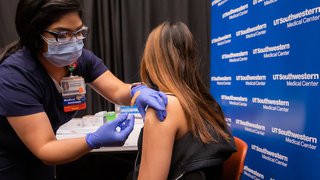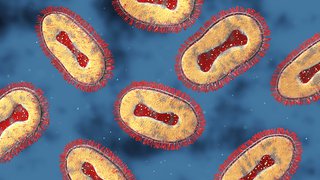Visitors, doulas, and video calls: Birth plan updates during the COVID-19 pandemic
April 7, 2020

Physical distancing, visitor restrictions, and other COVID-19 safety measures have changed the typical experience of having a baby. Protocols are in place to reduce the spread of the virus, and that likely mean that friends and family will have to wait to meet your baby.
But our patients aren't letting the guidelines get them down.
With a little planning, flexibility, and the help of technology, they're welcoming new opportunities to connect with their baby, partner, and family in unexpected ways despite the unique challenges of COVID-19. Consider these tips to update your birth plan and introduce your new baby to eager loved ones.
Your 2020 delivery checklist
Ask about your hospital's visitor and support person policies
All patients have the right to have a support person by their side during labor and delivery. That said, UT Southwestern and most other hospitals that care for pregnant patients and newborns are limiting and screening visitors to reduce the risk of COVID-19 infection.
Many hospitals, including William P. Clements Jr. University Hospital, are limiting visitors to only the patient's support person, such as your partner or a close friend.
If you plan to use a doula, check with your hospital. The doula may count as a provider rather than a visitor. If that's the case, you may be able to have both your doula and your partner or support person in the room, provided everyone is healthy. Or the hospital may have technology that allows the doula to be present in a virtual way to provide support.
Couples who are adopting or working with a gestational surrogate may also be able to be present at the hospital for the birth. Intended parents who must travel to meet their new baby should look into these details right away. For example, at Clements University Hospital, the patient can have one support person or visitor with her during labor; the baby can also have a parent as a visitor after he or she is born.
Take a Virtual Tour of Our Labor & Delivery Suites
As part of our COVID-19 emergency response, tours of the labor and delivery and postpartum areas at William P. Clements Jr. University Hospital have been temporarily suspended. This video provides of preview of the accommodations for new moms and their families.
Some patients are worried about coming to the hospital to deliver. A few have mentioned they are considering going to a birthing center or giving birth at home. The hospital is still the safest place to deliver, particularly if something unexpected happens, such as fetal distress or the need for a C-section. Don’t let these changes regarding visitors scare you into making a choice that isn’t the best for you and your baby.
If you have COVID-19 when you go into labor, we will have you deliver in a special room designed to manage risks associated with airborne infections. Protocols are in place to protect you and the baby from further exposure. If you have a positive test for COVID-19 and are close to your delivery date, check with your doctor about your hospital’s specific visitor policy on patients with a COVID-19 infection. Some hospitals have further limitations that you need to know about before going into labor. There are also recommendations about newborn care you will need to consider; the more time you have to consider your options, the better.
Enlist a back-up support person
One of the most important things to remember in outbreaks like COVID-19 is that plans must be flexible. If your support person becomes ill, they will not be allowed to attend the birth. It's important for patients to plan for a stand-in who can be ready at a moment's notice.
Related reading: The 2019 Novel Coronavirus (COVID-19)
Involve your children in other ways
Hospitals aren’t allowing children in as visitors, so consider other ways to include them. Ideas may include video chats, making welcome cards and posters, or chalking the driveway with welcome home messages. Teach them about the importance of washing their hands before touching their new sibling.
Check your tech
Video calls are a safe and interactive way to introduce your new baby to loved ones who are ill, quarantined, or who live far away. We're already seeing patients set up Google Hangouts, Skype chats, and Duo or Facetime calls with loved ones in lieu of in-person visits. Some patients have told us the visitor restrictions reduce the pressure to “entertain” loved ones. They can’t just drop by the hospital or your home, so you can schedule virtual visits and not have to feel compelled to pick up if you're tired or busy with the baby.
This is major. The first few days after you meet your new baby are precious. And while you might choose to share certain moments on social media or video chat, you won't have to feel pressured to look “postpartum perfect” or act a certain way to make others happy.
As an alternative, some hospitals provide 24/7 virtual connections for family members through secure video links. The neonatal intensive care unit at Clements University Hospital offers this option.
COVID; Prevention; Your Pregnancy Matters
COVID-19 and pregnancy: Answers to 10 key patient questions
- Robyn Horsager-Boehrer, M.D.
March 17, 2020
Tips for having visitors once you get home
It’s your decision whether to accept visitors in your home. The Metroplex – and much of the country – is currently under shelter-in-place recommendations. Even if this is lifted soon, we recommend you limit – or simply don't allow – visitors until risks within the state are highly decreased.
If you choose to have visitors at home, ask them to follow these recommendations and help reduce the risk of infection to your newborn.
Stay home if they're sick
Or anyone in their house is sick. Or a colleague is sick. Or they've traveled in the last two weeks. Even if they don't have symptoms. Feel free to check their temperature before letting them into your house. You get the idea. As much as you'd love all your friends and family to meet the baby right away, risking the baby's health or yours is not worth it.

Wash your hands
This is always a recommendation when visiting a newborn, but it's especially important now in reducing the risk of spreading viruses to the baby. Insist that guests to wash their hands or use hand sanitizer as soon as they arrive at your home. If they touch their faces or surfaces, don't hesitate to ask them to wash again. If they don't want to, it’s best not to let them hold the baby.
Refrain from kissing or touching baby's face
Respiratory droplets – from the mouth and nose – are a major carrier of viruses, such as COVID-19. And the mouth, nose, and eyes are direct openings into the baby's body through which viruses can pass. Kissing or touching the baby's face, or close contact during feeding, can increase their risk of infection.
Plan visits and keep them short
Request that visitors ask before stopping by, and that they keep visits short. Don’t feel guilty for turning guests away or asking people to leave early. Getting rest is important, and it’s your prerogative to take time to heal and bond with your newborn.
Consider drive-by visitors
Let visitors pull up to your driveway and show off the baby from a safe distance. Even better if they can drop off necessary groceries or hospital supplies! While your birth plan might be different with the current COVID-19 recommendations, you can still have a fulfilling and memorable experience.
We are here to answer your questions and help you shape your updated birth plan. Call 214-645-8300 or request an appointment online.












